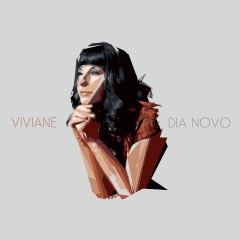 Je moet van goede huize komen, wil je nog iets toevoegen aan de fado hausse die West-Europa overspoelde, begin jaren ’90. Zangeres Viviane brengt met haar vierde cd ‘Dia Novo‘ (Nieuwe Dag) een nieuw geluid waar de fado weliswaar steeds dichtbij is, maar waar ook andere muziekstijlen zich nestelen in de saudade, de ziel van deze Portugese muziek.
Je moet van goede huize komen, wil je nog iets toevoegen aan de fado hausse die West-Europa overspoelde, begin jaren ’90. Zangeres Viviane brengt met haar vierde cd ‘Dia Novo‘ (Nieuwe Dag) een nieuw geluid waar de fado weliswaar steeds dichtbij is, maar waar ook andere muziekstijlen zich nestelen in de saudade, de ziel van deze Portugese muziek.
English version below
Nadat de fado zich van het dictatuur-imago had ontdaan en de fadista Amalia Rodriguez een hoge nationale onderscheiding kreeg, werd deze nationale muziek van Portugal razend populair in de jaren ’80. Toen begin jaren ’90 de fado heel West-Europa overspoelde, omarmde ook Nederland deze bijzondere Portugese muziek. Cristina Branco, Mariza en Mafalda Arnauth werden een ster in Nederland en zelfs onze eigen Nynke Laverman zong fado, weliswaar een Friese variant op teksten van Slauerhoff.
‘Dia Novo’ is de nieuwe solo-cd van zangeres Viviane. Ze wordt geboren in Frankrijk maar groeit vanaf haar 13de op in Portugal. Start in 1990 met o.a. snarenspeler Tó Viegas de band Entre Aspas met wie ze zes albums opneemt. Deze Viegas produceerde ook haar nieuwe cd en speelt verdraaid strak guitarra Portuguesa, cavaquinho (soort ukulele) en akoestisch gitaar waarmee hij de kern van begeleiding voor zijn rekening neemt, aangevuld met bas en drums. Viviane heeft een prachtige stem, beetje hees met een sympathiek (fado)timbre. Ze zingt muziek die met zijn wisselbas en sprankelende guitarra Portuguesa tegen de fado aanleunt, maar door de ritmiek ook duidelijk linken heeft met popmuziek. Ze schreef bijna alle stukken samen Viegas en zingt overwegend in het Portugees. Bijzonder is het Spaanse ‘Con Todo Palabra’ van de unieke Mexicaanse zangeres Lhasa de Sela; in 2010 overleden aan borstkanker, 37 jaar oud. Eveneens opmerkelijk is het Franse slotlied ‘Comment te dire Adieu‘, van de Franse liedjesschrijver Serge Gainsbourg waarmee ze haar Franse verleden reflecteert. ‘Dia Novo’ is de eerste cd van Viviane die uitkomt in Nederland en waarmee ze de basis legt voor een re-revival van Portugese (fado)muziek.
English version
You have to be a good musician, to be able to add something new to the fado boom that swept across Western Europe in the early 90s. Singer Viviane released her fourth CD ‘Dia Novo‘ (New Day). A new sound is to be heard where fado is still nearby, but where also other musical styles nestle in the saudade; the soul of this Portuguese music.
After the fado was rid of the dictatorship-image and fadista Amalia Rodriguez received a high national award, the fado became wildly popular in the 80s. In the early 90s fado engulfed throughout Western Europe and also the Netherlands embraced this special Portuguese music. Cristina Branco, Mariza or Mafalda Arnauth became stars in the Netherlands and even our national singer Nynke Laverman sang fado, although a Frisian variant with texts written by Slauerhoff.
‘Dia Novo’ is the new solo album of singer Viviane. She was born in France but grew up in Portugal from her 13th. In 1990 she started with strings player Tó Viegas the band Entre Aspas and recorded six albums. Viegas is also the producer of her new CD and plays twisted and tightly guitarra Portuguesa, cavaquinho (a kind of ukulele) and acoustic guitar supplemented by bass and drums. Viviane has a beautiful voice, a little hoarse with a lovely sympathetic (fado) timbre. Her music leans to fado by the sparkling guitarra Portuguesa and the rhythm of the bass and there’s also a clear link to pop music. She wrote almost all the pieces together Viegas and mostly sing in Portuguese. Particularly is the Spanish song ‘Con Todo Palabra’ of the unique Mexican singer Lhasa de Sela; in 2010 deceased from breast cancer, 37 years old. Also noteworthy is the French final song ‘Comment te dire adieu‘, written by the French songwriter Serge Gainsbourg in which Viviane reflects her French past. ‘Dia Novo’ is the first CD of Viviane which was released in the Netherlands and could be the foundation for a re-revival of Portuguese (Fado) music.
- Viviane: ‘Dia Novo’ (ZipmixRecords/Xango)
- Pictures Ron Isarin
© Mattie Poels.

Geen reacties